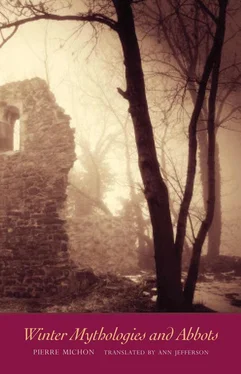It is to some secondhand chronicles, to the General Statistics of the Vendée published in Fontenay-le-Comte in 1844, and to a belated happenstance in my own life that I owe the tale I am about to relate.
It is the year 976. Ancient Gaul is a hotchpotch of names bolted to lands, which are themselves names: Normandy belongs to Guillaume, Guillaume Long-Sword; Poitou belongs to Guillaume, Guillaume Towhead; France belongs to Eudes, duke of France; the crown, that trinket, belongs to Lothaire, the king, which is to say squire of Beauvais and Laon. For Anjou and the Marches it’s Robert the Calf and Hugues the Abbot. Alain of the Twisted Beard controls Brittany. And the diocese of Limoges is in the hands and under the miter of Èble, brother of Guillaume, not the Long-Sword but the fair-haired, frizzled Tow-head. The towhead has two characteristics: it is too fair and too full; it blazes up in an instant. Guillaume is too fair and his anger gallops like fire. Èble has his brother’s towhead but without the tow’s two qualities: beneath the miter of the one and the helmet of the other you can see the same hirsute swirl of frosted locks, the same frothing fuzz, the same crushed straw with short curls, but on Èble’s head the tow does not catch fire at the least impediment; on Guillaume’s head it does.
Whether Èble’s towhead might blaze for other reasons, this tale will tell.
Èble has spent his life putting out the fire on Guillaume’s head: he has kept watch on the embers, cultivated the ash. The real policies of his brother — the alliances and the gifts, the endless parleys — were carried out by him while the other hothead drove his flames against Long-Sword, against Eudes, against Alain, against anything that bore a name and a lance. Èble is weary; he’s thrown in his hand and withdrawn from the world. He is sixty years old. He has relinquished the bishopric of Limoges and the monastic benefices from Jumièges, Angély, and Grammont. He will never again have the pleasure of excommunicating anyone. He no longer has the power of the keys, the power to condemn paltry or wicked souls to hell, nor has he the patience to run his cool hand over the boiling head of Guillaume. Fire is no longer his affair. On the midget island of Saint-Michel, facing the vast sea, he is contemplating the clouds and the water. For he has kept the midget Abbey of Saint-Michel.
The monastery is devoid of charm, thrown together with planks of wood and peat, for the whole thing, which was founded and consecrated by Philibert the Ancient, has been trampled a hundred times over by the Normans — burned down, bailed out, rebuilt, taken apart. The walls of the chapter house are cob, the cloister is raw brick. The choir is older, built of the local white stone, but the fires have turned it black. It is fire too which melted the great bells, and the ones hammered by the blacksmith brother are small and shrill. A ring of logs forms the library — which, besides some canonical odds and ends, contains the Life of Saint Martin , the Life of Saint Jerome , and much learned bullshit from before the Revelation. Right up against the library is the very long, two-story hut where the monks eat and sleep. All these buildings have landed here like dice thrown from a cup. The eye meets nothing that has been made to last. It’s named for the wilderness, the hermitage, Saint-Michel-en-l’Herm. It suits Èble very well. He has merely fortified the islet with good white stone from Luçon brought by water on barges, so that people can tell from afar that this hut belongs to God, which is to say to Èble the abbot, who has the gift of quelling fire, even the fire belched by a Viking dragon. Èble is the man of unimpressive stature and bulk, but with a completely white and remarkable towhead, who is contemplating the water in the month of May around the year 1000.
The water does not consist entirely of water.
The midget island sits just inside the mouth, facing the sea where two rivers marry, the Lay to the right and the Sèvre to the left: and as it happens these nuptials are rich with sand, mud, oyster shells, and all the debris that rivers calmly snatch up and crush: windfall and dead cows; the waste that men throw out in sport, from necessity, or from weariness; and sometimes their own human bodies thrown likewise in sport, from necessity, or from weariness. With the result that it’s neither the forthright sea nor the honest river that Èble has before his eyes but something mixed and tangled: a thousand arms of fresh water, as many arms of salt water, and as many again of water that is neither fresh nor salt embrace a thousand plots of naked blue mud, naked pink and gray mud, red-brown mud, worthless sand where the devil — which is to say nothing — plies his trade. Besides, he is the only being able to set foot here because everything else — men, dogs and horses, field mice — is instantly swallowed up in a shroud of stinking gases. Only the flat-bottomed barges come this way bringing the monks’ pittance over the water’s arms, and even then the water is so thin that you need to use long poles to sail across the mud. It’s not earth, because seagulls screech above the eels, or sea, since crows and kites fly up with vipers in their beaks. Èble is not sure that this does suit him so well: it’s like when you don’t know whether the meadow at Longeville belongs to Twisted Beard, Long-Sword, or Tow-head, and you have to unsheathe iron and square the parleys in order to decide whether Longeville belongs to one of the three or to all three at once, which is as good as to say to the devil. Èble thinks for a moment about his brother Guillaume, softens at the memory of this man of fire who doesn’t belong to the devil. He pictures Guillaume with broigne, halberd, and helmet, his fair tow hair in the wind, lance held aloft, riding his horse determinedly across the marsh, flying over it at an angelic gallop, like Saint George. Èble smiles, though you can’t see it since we’re looking from some way off and his back is turned as he leans against the fortifications, a tiny dark figure bearing a radiant head at one end — for this is a black monk, a Benedictine, clearly silhouetted and visible against the white limestone.
This same evening in May, after Vespers and None, at the hour when the first lamps are lit and before the first psalms are sung, he summons all the monks to the chapter house: some fifteen patricians like himself, drawn or banished here by a violent reading of the Life of Saint Martin , by their courage, by their cowardice, by a brother who wants to rule alone because the fiefdom is only small, and — who knows? — some by God. A few lay brothers too, clerks of humble origin, called by the prospect of bed and board, and some by a desire for books. You can hear the seagulls and the sounds of water. Èble looks at them one after the other in the early lamplight as it dances on their faces, faces that are sharp, heavy, crushed, burning, or calm. Then he makes the sign of salvation, and the others do the same, casting huge shadows of arms onto the cob walls. He allows more silence to go by — he knows how you govern, he has parleyed in close-fought argument with Louis, late king of France, with Alain and Eudes; he has even taken fiefdoms with a smile and a few pretty words from Guillaume Long-Sword, a Viking’s son and almost a Viking himself — he lets them contemplate at leisure his towhead and his mouth, from which there will emerge a sound that is different from the cry of the seagulls which measures time. Eventually he asks Brother Hugues, who is young and a clerk, to come and stand beside him and to open the Book.
He asks him to read the Third Day of Creation.
Читать дальше











